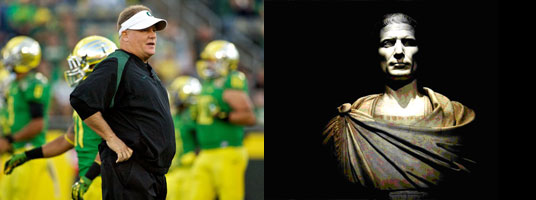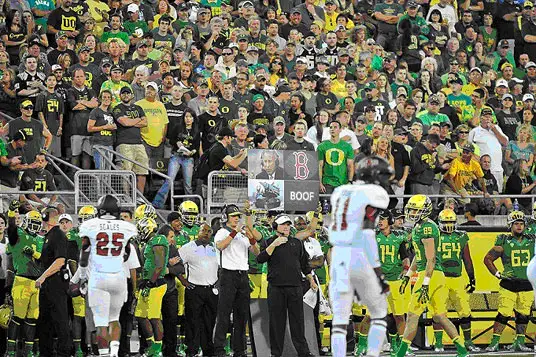At first blush, the comparison might seem odd. What do a football coach and a general/politician/dictator separated by over two thousand years have in common? How could a man who singlehandedly destroyed the republic of Rome have anything in common with a modern-day football coach? The answers might surprise you.
Football is a form of simulated combat, so the metaphor of coach-as-general and vice-versa is, in fact, an apt one. If you study the maneuvers of the Roman army on a battlefield, it becomes quickly obvious that there are quite a few similarities between football and armed combat.
Caesar was about innovation and speed. Chip Kelly is about innovation and speed. Caesar would often use strategies that his opponents were not expecting, as Kelly does on a regular basis. If you expect the Ducks to run outside, they might run between the tackles instead. The following is an example of how the two leader’s mindsets work in similar ways:
“Pompey and General Labienus had expected him (Caesar) to place the 10th legion (a legion was the standard army unit of approximately 6000 men) on the right wing…and made their dispositions accordingly, so now, as Caesar formed his battle line, he allotted the 10th to the left wing…just to keep Scipio on his toes.“ (From the book Caesar’s Legion by Stephen Dando-Collins).
This sounds similar to the play outlined here at FishDuck recently, when the Ducks lined up as if to run the Power Play to the left — which the Beavers were expecting — and instead ran the Inside Zone Read.
Athletically, the Ducks sometimes don’t have the same numbers of four- and five-star athletes that teams like USC and Stanford often have on their rosters. Kelly’s team has never been able to rely on pure athleticism to win; the Ducks have to play a true team game. Caesar was regularly outmanned by opposing armies as well, whether he was fighting Germanic tribes, or the Legions of Pompey the Great during the civil wars. When up against 60,000 Belgian and Germanic warriors with only 5,000 infantry and 2,000 cavalry, Caesar turned the battle in his favor by using this clever tactic:
“Caesar was always thinking, always innovative, and at the camp gates he had his men build walls made of a single brick’s thickness of earth. From the outside it looked as if the gates were as solid as the walls, and the tribesmen didn’t even bother to attack there, the gates normally being the most heavily defended part of any Roman camp. Instead, they tried to storm the walls at various places. With sixty thousand Belgians and their German allies congregating around the walls, Caesar gave an order. His flag dropped, trumpets sounded. The apparently solid walls at the gateways suddenly tumbled outward, and the Roman cavalry charged out into the massed ranks of the enemy. The results were panic and slaughter. Tribesman were still running at sundown.” (From Caesar’s Legion)
How many times have opponents played the Ducks, expected certain plays, and instead gotten something completely different? Consider the 2010 game vs. Stanford, when Oregon had just scored, but the Cardinal still led 21-10. At that point, there was plenty of time left in the first half. The Ducks lined up as if for a normal kickoff. Instead, they went for an onside kick, completely surprising the Cardinal. Oregon recovered, scored, and the rest as they say, is history. That play gave everyone insight into how Chip Kelly’s mind works.
Listen to these examples of how Caesar used speed and innovation to gain an advantage over his foes:
“After receiving a deputation from the Helvetii, the tribespeople from Switzerland who were attempting to migrate south through Roman territory, Caesar told them that he needed more time to consider their migration plan. As soon as they left, Caesar sprang into action, “rapidly constructing a massive earthen wall nineteen miles long…From the Jura mountains all the way to Lake Geneva, sixteen feet high with ditches in front and forts along its length…When the Helvetian elders returned on the appointed date, they stared in awe at a formidable barricade as high as three men stretched across the entire plain. Just a month earlier, their way had seemed clear and easy, but now this upstart Roman general had dared to fence in tens of thousands of Gaulish warriors.” (From Julius Caesar by Philip Freeman.)
When fighting the Germanic tribes, Caesar had decided that he needed to find a way across the Rhine River that was “safe, under his control, and — perhaps most important — impressive. It was then that he conceived his audacious plan to build the first bridge across the Rhine…what Caesar was proposing was unprecedented. In a period of just a few days he proposed to span a swift-moving river at least eight hundred feet wide and up to twenty-five feet deep…any competent Roman engineer would have told Caesar that spanning the Rhine — if it were possible at all — would require many weeks of hard labor…after only ten days, Caesar’s bridge across the Rhine was complete.” (Julius Caesar)
Just like Chip Kelly has revolutionized the way plays are signaled to the offense by using an elaborate sign system (which may or may not be a ruse — no one seems to know for certain), Caesar also created his own code, in order to send messages to the army or to friends. Known today as Caesar’s cypher, it is said that “to understand their apparently incomprehensible meaning one must number the letters of the alphabet from 1 to 22, and then replace each of the letters that Caesar has used with the one which occurs four numbers lower — for instance, D stands for A.” (From The Twelve Caesars by Suetonius.)
There are many other ways that these two men are similar: Both are bold, aggressive, clever, innovative and quick-thinking. Both men have risen from somewhat obscure backgrounds to shake their respective worlds and change the standard mindset of the status quo. Neither suffers fools gladly. And while Caesar was also a politician and Chip Kelly is not (something the establishment in Washington can be thankful for — can you imagine the changes he could effect?), they are the kind of men that make their followers adore them and want to play – or fight — as hard as they can. No player on the Ducks wants to let Chip down, and no soldier who fought for Caesar would dare to disappoint the Great Man.
Separated by two millennia, and worlds apart, Chip Kelly and Julius Caesar are both one of a kind, and we likely won’t be forgetting either man for a long time.
Don Gilman is a second-year communications major at Umpqua Community College in Roseburg, Oregon. In addition to writing for FishDuck.com, he has been published in the Roseburg News-Review Newspaper, the UCC Mainstream Newspaper, Bucketlist Publications and is the featured author in the June, 2013 edition of eHorror magazine (under a pseudonym.) In 2013 Don received two awards from the Oregon Newspaper Association’s annual statewide college competition: Third place for Best Feature Story and second place for Best Spot Photography.


